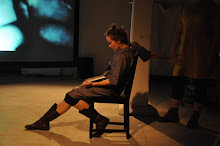I haven't slept in Berlin since I got here. There's something about morning that wakes me up. And there's something for the rest of Berlin about nighttime that wakes them up. I stumbled out of bed yesterday at 7 having gone to sleep at 4, and walked toward the center of the city, which I happen to be in walking distance from. I passed Berlin's largest cathedral. Then I walked back and went in. The cathedral is everything you would want it to be. Big, impressive, echo-y, Protestant. I sat down and an invisible brass quintet played something by Bruckner. I struggled to maintain my composure. I become sentimental when I'm tired. But it was beautiful. I even sat through a sermon I couldn't possibly understand. But of course "Amen" would still mean Amen on the moon...
I went to a performance of Simon Boccanegra at the Deutsche Oper last night. Several things were thrilling about it. One, I knew the conductor because he had been our rehearsal conductor for Aida. He actually WAVED TO ME from the stage during his last bow. Two, I ran into the theater 3 minutes before curtain and still managed to sit front row, center. Can you imagine sitting front row center at the Metropolitan Opera for ten dollars having bought your ticket within three minutes of curtain? You can't.
However, everything else about the production made me embarrassed for the Deutsche Oper. I will try to explain why, but it demands the elucidation of a paradox which I am still at pains to understand myself: Opera lovers worldwide prefer staged opera to concert opera, but they actually seem to *prefer* bad staging.
As a quick preamble to a few comments I will make, let me first give you three instances of staging snafus in the show last night to give you a sense of what I'm referring to.
1. In Boccanegra, the first 20 minutes of the opera is actually a prelude to the rest of the action that happens "25 Years Later." Last night, in the prelude, the entire cast initially appeared looking like it had stepped off the set of A Christmas Carol: Boccanegra was dressed like Ebenezer Scrooge and the women wore bustle skirts. Then, inexplicably, for the First Act, the cast changed into modern-day dress. In other words, we sped forward in time from 1843 to 2008. Why, I ask you.
2. In another scene, Amelia is supposed to hit her lover over the head with a bottle in order to knock him out and then hide him in a closet. What actually happened, probably due less to lack of rehearsal and more to a lack of any discernible interest on the part of the singers in realistically executing the staging, was that, anticipating the blow, Amelia's lover fell backward BEFORE she even raised her bottle. Amelia, who was looking at the conductor and not at what she was doing, missed his head, striking him instead on his rear. The two of them then found themselves so far upstage of the closet into which the lover is supposed to have fallen that he actually had to throw himself 5 feet backward, and Amelia rushed after him to shut the door.
3. A final example: in the last 10 minutes of the opera, Simon has been poisoned. He is directed to fall on the floor to experience the agony of dying. But he has 10 minutes of singing left. It's difficult to sing from a reclining position so after 3 or 4 minutes he gives up, and stands up again. 5 minutes later he recovers his death instinct, staggers back to the floor (although this is at least a 5-step process involving knee pads and so on, since the singer weighs 300 pounds) and ... curtain.
The way I experience stuff like this is like trying to watch a Tom and Jerry cartoon where the sound track is six seconds behind the animation. You've had this experience. It's totally unnerving. The audio is so completely out of sync with the visual that it's just not worth the pain of mentally trying to piece the two back together. The really weird thing about opera, though, is that the equivalent thing could be happening onstage (meaning what's happening musically is happening musically, but what's happening visually is being beamed in from Mars) and no one seems to mind. This is the paradox I mentioned earlier. Staging's self-erasure is horrifying for me. It creates dissonance, for godssake. But for everybody else, staging cancels itself out, and then all that's left is music... music... glorious music.
Somebody, help me. When opera dies I wanna go down with the ship, in denial. But I need a new set of ears. Maybe by the time I'm 65...
Subscribe to:
Post Comments (Atom)




1 comment:
but isn't a huge part of being an operagoer the expectation that none of it is going to look like real life? emotions are supposed to be as big and histrionic as our narcissistic egos imagine them to be, but gorgeous as songs. people are supposed to do things like duel. or fly. while singing at the top of their lungs, wearing a dress that weighs 150 pounds (or backwards pink bathrobes, whatever). i think i'd be more boggled by a production that attempted verisimilitude; i haven't been to anywhere near as many productions as you have, but i think part of the attraction of it is that it's so like dreaming.
Post a Comment